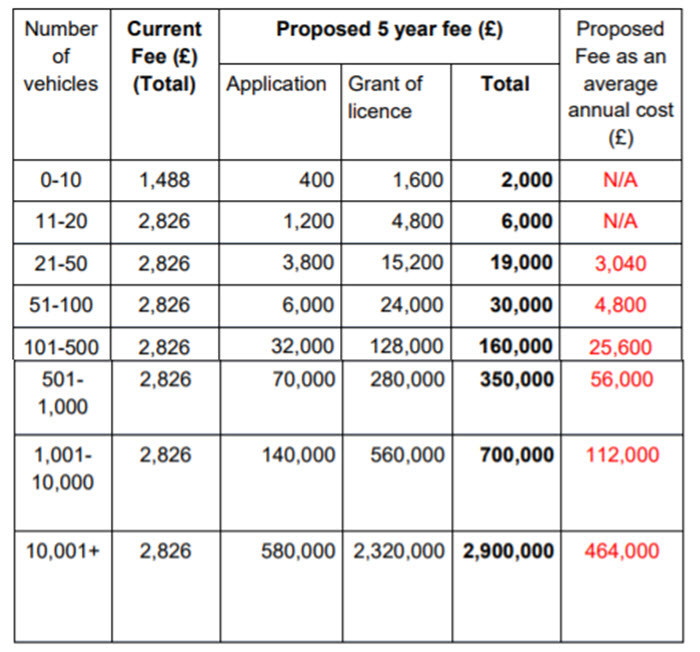There’s only a few days left before Uber finds out whether they will be allowed to continue operating in London, and it now looks like they will have to pay £2.9m in licensing fees if their application be successful.
TfL’s new plans for Operator Licensing Fees have been agreed by their Finance Committee during a meeting that took place on September 15th.
In April 2017, TfL released a new pricing proposal – detailed in our article “TfL’s Potty Proposals for Operator Licensing Fees” – the title of which referenced the LPHCA’s description of the plans for a five-tier, rather than the current two-tiered approach. This sparked fears amongst many in the industry, as the smallest operators would have been hit by disproportionately large increases.
The new eight-tiered structure sees the introduction of a £2.9m fee for a five-year licence, for operators with 10,000+ vehicles – that’s £464,000 per year. In these amendments to the plans, it appears that TfL have attempted to address some of the spikes in costs for operators as they grow their fleets. Though cliff edges rises do remain, and the issues these might cause are discussed in our previous blog.
The New Fee Proposal

Source: TfL
What Are The Consequences?
The new plan will be less detrimental to small operators than the previous proposal. But it will have a big impact on the medium-sized and the larger ones.
A company with only 21 vehicles will see their licence fee jump from less than £3,000 to nearly £20,000. This will have a major financial impact on their operating costs, and could leave them struggling.
Currently, the fee is only £2,826 for operators with more than 1,000 cars, so the new pricing structure could be more than 250 times higher for an operator with 1,001 vehicles, or a thousand times more for those with more than 10,001 vehicles!
For example, Addison Lee, that currently pays £2,826, would now be charged £700,000 (falling into the bracket of operators with 1,001 to 10,000 cars). A further 10 operators with between 500 and 1,000 cars will now have to pay £350,000. Uber will pay almost £1m more than originally planned if their licence is renewed.
For Uber However, Time May be of the Essence
It isn’t very clear when the new proposal is due to be implemented, but it looks like it could come into force on the 1st of April 2018. But Uber’s licence is coming up for renewal way much sooner than that… This raises the prospect of them being given another six-month extension – like Addison Lee were – which would take them to the end of March next year, right before the new pricing structures come into force.
TfL said the changes are necessary to cover the costs of the increased number of minicabs on the roads. The changes are expected to raise millions more, but TfL warned that it still faces a shortfall.
Again we highlight our preference for investment in technology to aide compliance officers in their efforts to root out rogue drivers and reduce the need for more feet on the street.
This proposal could be detrimental to medium-sized operators. Also, it could have consequences on the way some operators manage their fleet to avoid “jumping up” a bracket.
To view the full proposal from TfL including new drivers fees and the results of the consultation that took place between April and June, read TfL’s “Taxi and Private Hire Licence Fees” document presented to their finance committee on September 15th.

